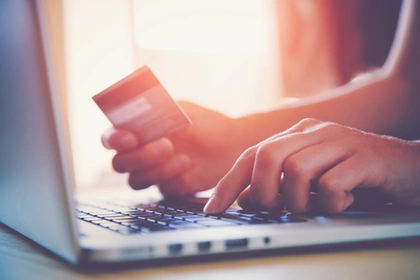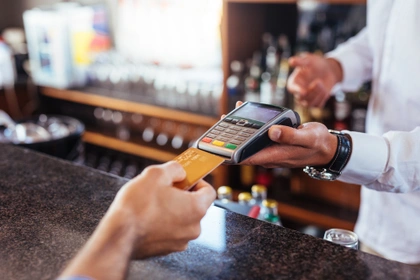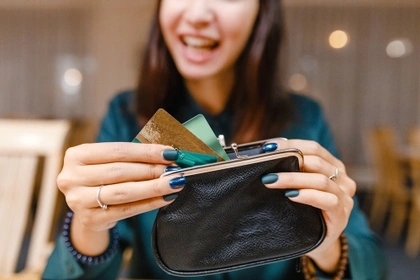Should I get a credit card?
Whether you should get a credit card or not depends on your financial situation and the goals you’re hoping to achieve. This could include building your credit score, consolidating debts, or paying for large expenses.
Before getting a credit card, consider your ability to pay off the balance in full each month, your current financial goals, and whether the card's benefits outweigh potential costs like interest rates and fees.
What can I use a credit card for?
You can use a credit card to pay for most of the things that you’d use a debit card for. They can be a helpful way to manage your money when paying for things such as:
-
Goods and services, including large purchases
-
Online shopping
-
Emergency expenses
-
Travel
Whenever you spend on your credit card, you borrow that money from the lender. So, it’s important that you can afford to make repayments and don’t overspend.
What are the pros and cons of using a credit card?
1. A convenient way to pay
Credit cards are accepted by most retailers and are an accepted form of payment in most countries. However, you should check with your provider before you travel, as there may be charges associated with using them abroad.
2. Flexible repayment options
You have two options when it comes to paying your credit card each month:
- Repay the balance in full every month; that way, you can avoid being charged interest.
- Repay the balance in monthly instalments, spreading the cost to make it more manageable.
Ideally, you should clear the full outstanding balance each month to avoid any interest. If this isn’t possible, you should at least pay the minimum amount to avoid negative markers on your credit report and any late fees (though interest will still apply).
3. Useful in an emergency
It can be helpful to have a credit card for peace of mind, in case of an emergency. Whether your car has broken down or the central heating packs up, you can pay for the repairs you need immediately with your credit card.
Again, it’s important that you’re able to meet your repayments in these scenarios. If possible, you should pay the balance off in full to avoid the added cost of interest.
4. The added protection of Section 75
When you use your credit card, you’re protected under Section 75 of the Consumer Credit Act. This could entitle you to a refund through your credit card provider if you buy something worth £100 to £30,000 that is:
-
Never sent to you
-
Faulty, broken, or not as it was advertised
-
From a company that has gone bust
Section 75 protects your money when you pay for an item or service that you haven’t been able to use due to circumstances out of your control. This protection is exclusive to credit cards and isn’t available if you pay with a debit card or cash.
5. It can help improve your credit score
Using your credit card responsibly will boost your credit score and your attractiveness to lenders. By paying on time and staying within your credit limit, you can show that you are a reliable borrower who can be trusted to pay your bills on time. This could better your chances of being approved for a better rate next time you apply for credit.
What are the disadvantages of using a credit card?
Interest will be applied to your balance (unless you clear it in full each month or you're in a 0% introductory period). Credit card interest rates vary depending on the card, the lender, and your own eligibility. Some cards also have variable rates, which means the interest rates can go up and down.
2. It’s borrowed money
When you buy something using your credit card, you owe your lender for that sum (with interest if you do not pay your balance in full). Try to clear the balance as soon as you can, and never spend more than you can afford to repay.
3. Introductory rates can change
Before applying for an introductory offer, check how long the deal lasts. You might take out a card with a 0% interest rate, only to find that the offer ends in a couple of months and the interest goes up.
Always aim to clear your balance within the introductory period to keep the cost of borrowing low.
4. It costs to withdraw cash
Wherever possible, you should avoid using your credit card to withdraw cash. It’s often free to do this with a cash or debit card, but not with a credit card.
Cash withdrawal fees are usually around 3% of the amount you withdraw. You could be charged interest immediately (even if you’re in an interest-free period).
5. It may harm your credit score if used irresponsibly
Borrowing more than you can afford or going outside of your credit limit can make it harder to clear your balance. Repaying the balance is likely to take a long time, and you’ll probably pay a lot of interest in doing so.
If you pay less than the minimum payment on your card, you could quickly find yourself in financial difficulty. Missed payments could lead to a default being added to your credit file.
What is the best way to use my credit card?
If you’ve decided a credit card is right for you, then you can make the most of the advantages and minimise the risks by:
-
Paying your balance in full each month. This means you’ll avoid paying interest and improve your credit score while you’re at it.
-
Making payments on time to avoid late fees and penalties. This will have a positive impact on your credit score too.
-
Managing your spending. Aim to use less than 30% of your credit limit to keep credit utilisation low.
-
Monitoring your account regularly to track spending and keep an eye out for any unauthorised charges.
-
Making use of your card's rewards. Whether that’s a 0% interest period or points on your spending, make the card work for you.
Ocean Credit Card
See if it's a YES before you apply
- Up to £8,000 credit limit
- Checking won't affect your credit score
- Get a response in 60 seconds
39.9% APR
APR Representative (variable)
Intelligent Lending Ltd (credit broker). Capital One is the exclusive lender.

Disclaimer: We make every effort to ensure content is correct when published. Information on this website doesn't constitute financial advice, and we aren't responsible for the content of any external sites.






